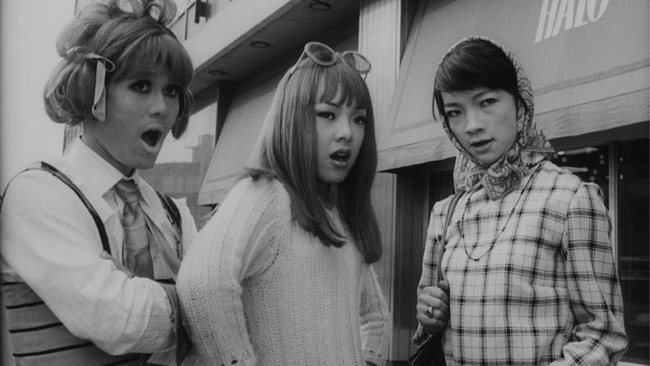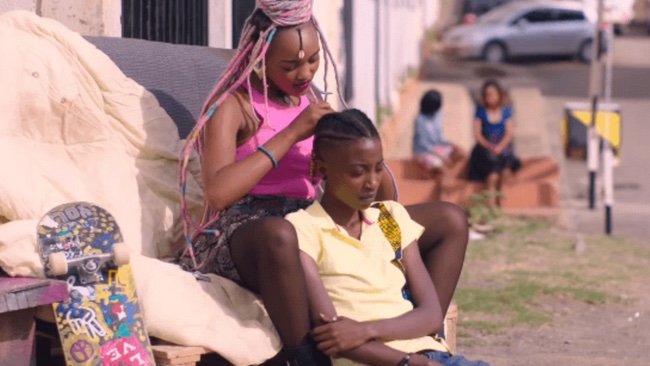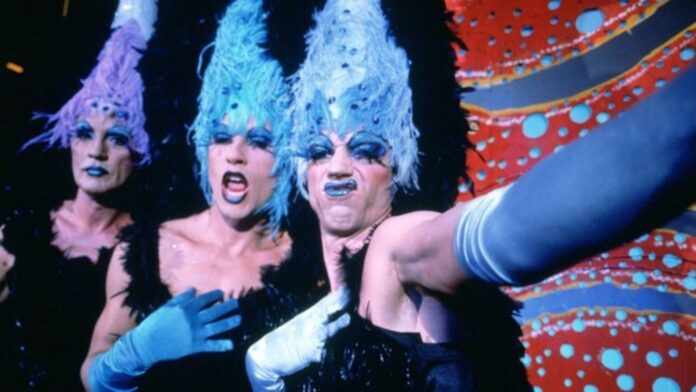For Pride Month, the Philadelphia Film Society is showcasing a half dozen international queer classics in its program, “It’s a Queer World After All.” Here is a rundown of what to watch.
The fun starts with the fabulous Aussie comedy that is celebrating its 30th anniversary this year, “The Adventures of Priscilla, Queen of the Desert,” (May 31 at 9:15 p.m.; June 22 at 6:30 pm). Mitzi (Hugo Weaving) and his friends Bernadette (Terence Stamp) and Felicia (Guy Pearce) come to terms with their lives and identities as they take a bus across the desert to perform in Alice Springs. The trio tease and take care of each other as they encounter character-building episodes — often involving homophobia — and “Priscilla” generates many laughs as the characters sling insults at others and each other. But they also find love in unexpected places. In addition, the various musical numbers throughout the film are fantastic. The magnificent soundtrack includes disco classics like “Finally” and “I Will Survive,” along with ABBA’s “Mamma Mia” among other songs for the actors to perform elaborate dance numbers onstage or on sand. The film’s message about acceptance may be obvious, but it is certainly told with wit and wisdom, and there is nothing wrong with a lot of gay pride. (Fun Fact: It was recently reported that a sequel is in the works!)
The late Toshio Matsumoto’s 1969 underground classic, “Funeral Parade of Roses,” (June 5 at 4 p.m. and 7 p.m.; June 15 at 1 p.m. and 6:30 p.m.; June 30 at 3:30 p.m.), mixes experimental and documentary film styles, and incorporates many visual effects, including speed-up and slow-motion photography, as well as flashback/flash-forward editing to create a literally eye-popping spectacle. Gorgeously shot in black and white, the film has Eddie (the mono-monikered cross-dressing actor, Peter) dressing up as a woman because, he explains in a documentary interview, he feels satisfaction “being myself.” Eddie is first seen having an erotic tryst with Gonda (Yoshio Tsuchiya) the male owner of Club Genet, where Eddie works. The couple talks flirtatiously after, but later, in a car driving away from their assignation, Eddie swears he has seen Leda (Osamu Ogasawara), a rival drag queen at Club Genet. Eddie fears Leda will get revenge for his stealing Gonda from her.
“Funeral Parade of Roses,” does not follow a linear narrative, which makes it confusing at times, it does feature deliciously bitchy moments between Eddie and Leda, including a delirious catfight shot in high-speed, and diverting scenes such as one featuring three “gay boys” (as the film calls Eddie and his drag queen friends) standing in front of urinals in skirts in a men’s room. However, be warned: “Funeral Parade of Roses” ends with a shocking and gruesome act that is quite disturbing.

The program features a sparkling new 4K print of “Young Soul Rebels” (June 7 at 4 p.m. and 7:30 p.m.; June 19 at 4 p.m. and 7 p.m.) Isaac Julien’s vibrant 1991 feature about two DJs in 1977 Britain. The gay Caz (Mo Sesay) and the straight Chris (Valentine Nonyela) are trying to increase visibility for their show, “Soul Patrol.” When one of their friends is murdered in a local park while cruising, Chris becomes a suspect. But he also may have a key to the killer’s identity. The film, which features a fantastic funk soundtrack and some fun visuals, is more attuned to atmosphere than plot as Caz falls for Billibud (Jason Durr), a punk, and Chris cozies up with Tracy (Sophie Okonedo), who works at a radio station. But even with its thin storyline, Julien makes the most of his opportunity to address racial discrimination, as well as classism and homophobia in Britain.
Gregg Araki’s edgy and thoughtful 1993 film, “Totally F***ed UP” (June 8 at 7 p.m. and 9 p.m.; June 28 at 4 p.m. and 7 p.m.), delivers “more teen angst” as a half dozen queer youths’ lives unfold in “15 random celluloid fragments.” Andy (James Duval) is cynical, but he becomes romantically involved with Ian (Alan Boyce). In contrast, boyfriends Steven (Gilbert Luna) and Deric (Lance May) uncouple after one has an affair. Patricia (Jenee Gill) and Michele (Susan Behshid) are also partners, one of whom is keen to have a baby. Rounding out the group is Tommy (Roko Belic), who encounters trouble when his parents learn he is gay. Araki films “Totally F***ed Up” in his patented low-fi, nihilistic style as the jaded teens hang out and talk about love and sex, as well as rail against homophobia and AIDS and other concerns. This compelling film, a snapshot of queer life in L.A, in the early ’90s, is all set, of course, to a fantastic soundtrack which only makes its despair more palpable.
Legendary filmmaker Rainer Werner Fassbinder’s influential 1972 feature, “The Bitter Tears of Petra Von Kant,” (June 9 at 6 p.m.; June 13 at 4 p.m. and 7 p.m.; June 23 at 1 p.m.) a stunning drama, based on his play, the film is set and shot, vividly, in a single room, which adds to its stifling nature. The title character (Margit Carstensen) is revealed through her interactions with a handful of women including Marlene (Irm Hermann), who lives with her and whom she abuses, and Karin (Hanna Schygulla), a young woman Petra is attracted to and falls in love with. However, Petra suffers disappointment in her relationship and agonizes accordingly. Fassbinder expertly uses the space, for the story is about control, and coaxes marvelous performances from his all-woman cast.

The terrific Kenyan lesbian romance, “Rafiki” (June 14 at 4 p.m. and 7 p.m.) directed and co-written by Wanuri Kahiu, was banned for a short time in its homeland for “promoting lesbianism.” However, this chaste romantic drama also addresses homophobia in a country where 1 in 5 people are assaulted for being queer. Kena (Samantha Mugatsia) is a tomboy who falls for Ziki (Sheila Munyiva) — which is unheard of in their town. Moreover, their fathers are political rivals. The young women talk and kiss and cuddle, but they also have a spat while attending a sermon on same-sex marriage. When their relationship is discovered, things really come to a head. “Rafiki” generated conversations, not just about freedom of expression but also sexuality, LGBTQ+ rights, and rights of privacy. It is a landmark romance that deserves to be seen.
For more information on “It’s a Queer World After All,” visit filmadelphia.org/its-a-queer-world-after-all.

